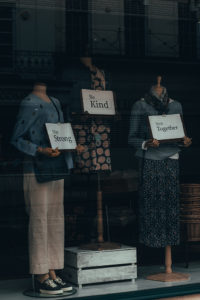Essential Work: Protecting Rights and Facing Inequity in an Emergency
 Photo by Alex Motoc on Unsplash
Photo by Alex Motoc on Unsplash Dire circumstances require drastic responses, sometimes to the detriment of human rights and constitutional liberties. Time and again, the United States reminds us that our rights are more fragile than guaranteed and can be swiftly denied in the name of national interest. Even so, we often look back on history with shame as we recount the particular instances of infringement: Franklin Delano Roosevelt’s internment of Americans during World War II; Richard Nixon’s war on drugs, which started with urine tests of soldiers in Vietnam and to this day bulldozes lives and liberty; and the passage of the Patriot Act after 9/11.
Currently, the Trump administration, Senate Majority Leader Mitch McConnell, and certain governors are exploiting the public health crisis brought on by the coronavirus in attempts—some successful—to restrict our rights in unnecessary and dangerous ways. For example, as reported by Politico on March 21, the Department of Justice “quietly” asked Congress to suspend habeas corpus. And exercising the right to vote meant risking lives in Wisconsin on Tuesday, while President Trump is calling for Republicans to restrict voting-by-mail. And the Supreme Court may soon decide if the governor of Texas can criminalize abortion (currently he can, according to a federal appeals decision). However, alongside these reckless and corrosive actions, there are real public health concerns that require us to pare back what our rights look like right now. I think most readers of this site will agree that in-person religious gatherings must not take place as we enter Easter, Ramadan, and Passover. But where do we draw the line between asking churches not to congregate and banning abortion?
The coronavirus pandemic is, first and foremost, a public health crisis, and therefore we should be following the lead of public health experts. An online article published March 18 at the Journal of the American Medical Association details sound parameters for how to proceed in this precarious time that apply not only to how we treat those infected and mitigate the disease, but how we respond to the strain the pandemic has put on economic and security systems long marred by institutional racism, sexism, LGBTQ discrimination, and xenophobia. As laid out by Lawrence O. Gostin, James G. Hodge Jr., and Lindsay F. Wiley in “Presidential Powers and Response to COVID-19,”
Achieving a careful balance between public health and individual rights requires adherence to 6 key principles: (1) interventions should be evidence-based and grounded in scientific knowledge, not political considerations; (2) health officials should make individualized risk assessments demonstrating a significant risk to the public; (3) coercive measures should be proportionate to the threat faced; (4) there should be no less restrictive alternatives to accomplish public health objectives; (5) individuals subject to deprivation of liberty should be afforded due process, including impartial hearings; and (6) government should ensure fair and equal treatment, avoiding stigma or discrimination against individuals or groups.
I would add that ensuring due process is necessary both for individual justice and for preserving checks and balances against those who would exploit this emergency for power grabs. Also, in ensuring fair and equal treatment, the government must specifically alleviate the burdens disproportionately forced upon Black and Brown, low-income, disabled, and immigrant communities. COVID-19 doesn’t discriminate, but the alarming demographic data coming out of Milwaukee, Chicago, and elsewhere demonstrates how finely honed structural racism is in our country and how it’s holding hostage low wage workers deemed essential. Their rights are not being protected right now and it’s costing lives.
In light of these costs, we must act. Here are three ways we can all balance our rights with overwhelming public needs right now.
Show up for each other. That means engaging in mutual aid. The more we help one another within our own communities, the better equipped each of us will be to fight this virus. Everyone has something they need right now, and everyone has something they can give. Building resource sharing lines and networks within our communities is vital. Showing up also means taking direct action to support those on the front lines. In the past two weeks, nurses, Amazon employees, gig workers (like rideshare or delivery drivers), and others have been striking to demand safer work conditions. If you’re not on the front lines, stay abreast of these strikes and act in solidarity.
Make your voice heard in Congress. AHA is continuing its advocacy efforts, guided by the above parameters, and we will keep humanists across the country in the loop on how to join our work. Check AHA’s Humanist Action Headquarters regularly for opportunities to make your voice heard by those who are making decisions that impact us all.
Stay home. The sooner we can end this crisis, the harder it will be for Trump and others to try to make these changes permanent. Please heed the pleas of health experts and elected officials and reduce outside activities to only the most essential tasks.
